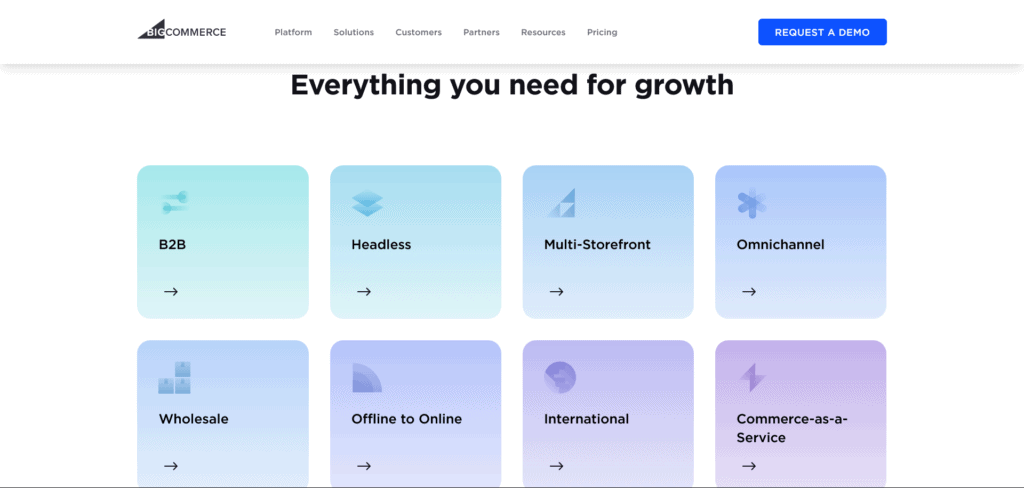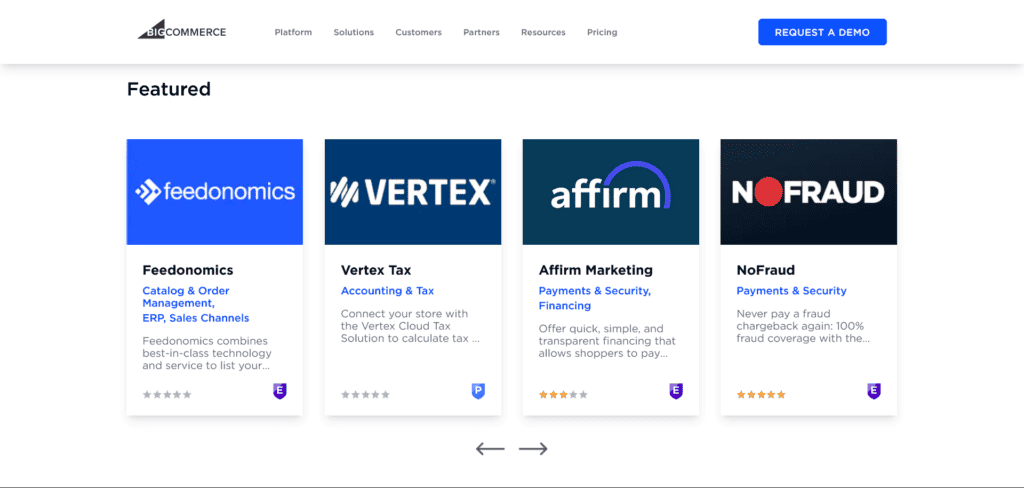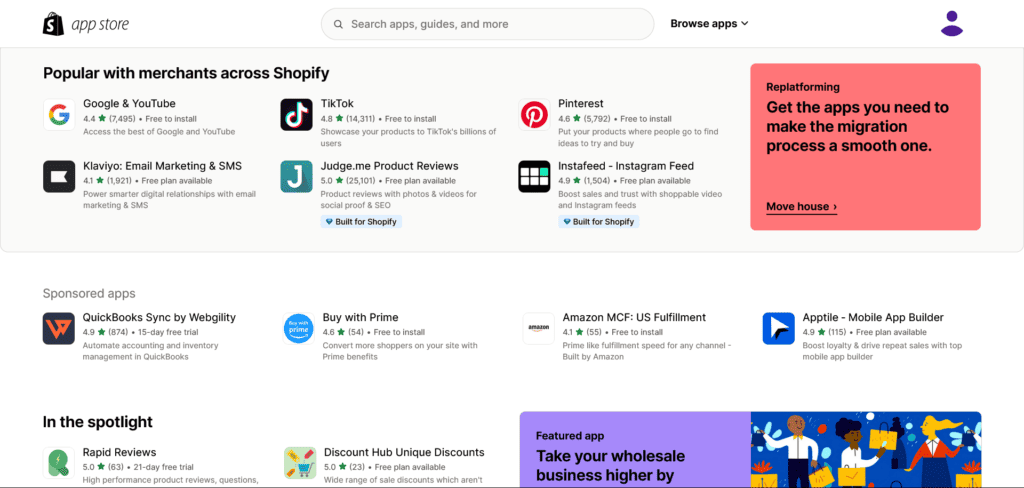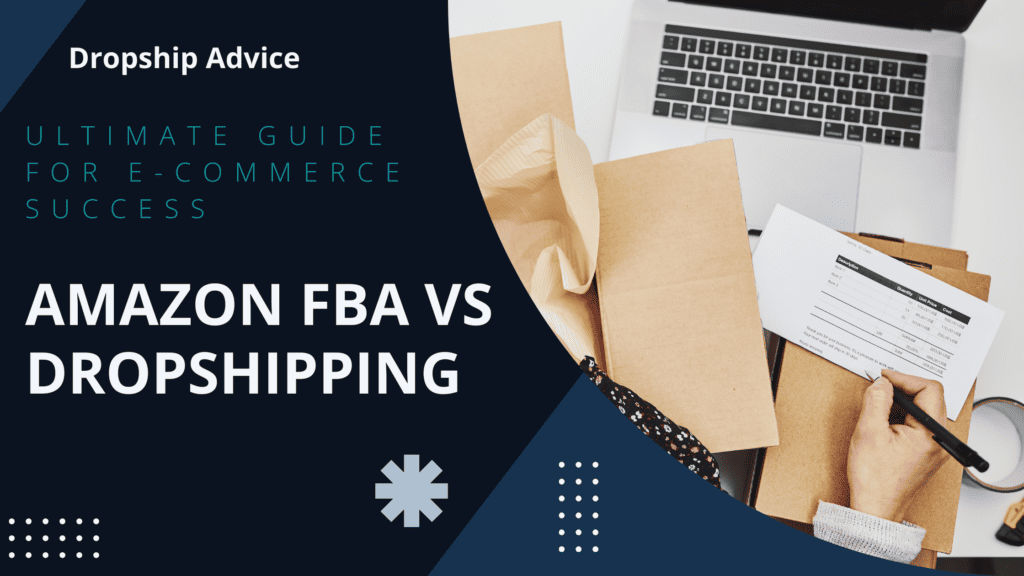In e-commerce, picking the right platform can change your business’s success. With options abound, two heavyweights stand out: BigCommerce and Shopify. The debate between BigCommerce vs Shopify is a common one among entrepreneurs, each platform boasting its own set of features and benefits.
In this thorough comparison, we’ll look at BigCommerce and Shopify. We’ll dissect their key features, prices, customization, and suitability for different business models. It is for new entrepreneurs starting their first e-commerce venture. And, for pros seeking to improve their online presence. This guide is designed to provide you with the insights you need.
Below, we’ll look at many parts of each platform. It will give you a deep guide. You can use it to make a smart choice. This blog post covers user-friendliness and predicting future trends. It gives you the knowledge and foresight you need to succeed in your eCommerce store.
What is BigCommerce?

BigCommerce is a strong ecommerce platform. It provides tools to start and grow your online business. BigCommerce focuses on mid-market and bigcommerce enterprise brands. It offers a wide range of features and is praised for its built-in tools. On competitor platforms, these tools often need third-party apps.
What is Shopify?

Shopify is the market leader in the ecommerce platform space. People love it because it’s easy to use and scales well. It also has the largest app ecosystem. It’s often the go-to choice for small businesses and first-time ecommerce sellers. But, its capabilities have grown to serve businesses of all sizes.
BigCommerce vs Shopify: Pros and Cons
No two platforms are perfect. But each has its advantages and disadvantages. These match the needs of different businesses.
BigCommerce Pros
- Built-in features for multi-channel selling
- Advanced SEO tools for optimizing your store
- A wide range of payment gateways
- Powerful native functionalities for marketing and analytics
BigCommerce Cons
- Higher base-level pricing compared to competitors like Shopify
- Less intuitive to beginners
- More limited choice in app variety and quantity
Shopify Pros
- Extensive Shopify app store, offering a tool for almost every need
- Highly intuitive and easy to use
- Competitive and scalable payment processing with Shopify Payments
- A range of professional, mobile-responsive free themes
Shopify Cons
- Limited in terms of built-in features; often requires apps.
- Transaction fees on lower-tier pricing plans
- Less customizable compared to BigCommerce, particularly for advanced users.
BigCommerce and Shopify: Pricing Plans
Price is always a major factor for small businesses and startups. You must understand the pricing of both platforms. It is vital to ensure you get the best value for your money.
BigCommerce Pricing Plans
- Standard: At $29.95 per month, this plan includes all the basics to get started.
- Plus: For growing businesses. They can get features like an abandoned cart saver and stored credit cards. These are available for $79.95 per month.
- Pro: The plan costs $249.95 per month. It is designed to help businesses grow. It includes Google customer reviews, product filtering, and other advanced features.
Shopify Pricing Plans
- Basic Shopify: Priced at $29 per month, this package is perfect for small businesses.
- Shopify: At $79 per month, this mid-tier plan offers additional features for growing businesses.
- Advanced Shopify: At $299 per month, this plan is tailored for businesses that are scaling fast and need more features.
Start your free trial now. Get 3 days free, then 1 month for $1.
BigCommerce vs Shopify: Ease of Use
BigCommerce Ease of Use
BigCommerce’s backend is intuitive for those with technical understanding. The dashboard design is clear. Navigation is simple once you understand the basics. However, for complete newcomers to e-commerce, there might be a small learning curve.
Shopify Ease of Use
Shopify is renowned for its user-friendly interface. The platform makes it easy to set up and manage your online store even if you don’t have technical know-how. The learning curve is almost flat. Their customer support is a standout feature for those who need help.
BigCommerce vs Shopify: Themes & Design
BigCommerce Themes
BigCommerce has a range of responsive and customizable themes available. The selection might not be as big as Shopify’s. But, the quality of design and ease of customization is undeniable.
Shopify Themes
Shopify boasts a vast theme store filled with professionally designed, mobile-responsive themes. These themes cater to many industries. You can customize them a lot.
BigCommerce vs Shopify: Apps & Scalability
BigCommerce Apps

BigCommerce has a growing number of built-in features and apps. The platform also works well with third-party apps. It expands its abilities and makes it scalable.
Shopify Apps

Shopify’s App Store is a treasure trove for those looking to grow their store. It’s extensive, offering a diverse range of third-party apps and integrations. It makes it exceptionally scalable, with solutions for almost any need.
BigCommerce vs Shopify: E-commerce Dropshipping
Shopify Dropshipping
Shopify made dropshipping mainstream. The platform is easy to use. It integrates with dropshipping apps. It has made it a go-to for many dropshippers.
BigCommerce Dropshipping
BigCommerce also caters to dropshipping, but it might not have the same level of integration with specific dropshipping apps as Shopify does, though it is making strides to fill this gap.
BigCommerce vs Shopify: Payment Gateways
BigCommerce Payments
BigCommerce offers a range of payment gateways, both local and international. They also provide their payment gateway. It can help to cut extra fees.
Shopify Payments
Shopify Payments is the in-house gateway. It also aims to cut out the middleman on fees. It provides an easy way for customers to check out on your site. It integrates seamlessly.
BigCommerce vs Shopify: Marketing Features
BigCommerce Marketing
BigCommerce’s SEO features are powerful. They allow for much customization to optimize your store for search engines. They offer built-in tools for email marketing and conversion optimization as well.
Shopify Marketing
Shopify is great at marketing. It can create and manage content through a blog and SEO features. Shopify app store also offers a multitude of marketing apps to suit every marketing need.
BigCommerce vs Shopify: Sales Features
Inventory Management
Both platforms offer robust inventory management tools. BigCommerce shines. It can handle complex inventory needs. Shopify’s user-friendly interface makes it easier to manage stock for beginners.
Sales Channels
Shopify has many sales channels. They go from Facebook to Amazon. They make it easy to sell your products where your customers are. BigCommerce also offers multi-channel integration, but Shopify’s is more extensive.
Point-of-Sale (POS)
Shopify’s POS system integrates with your online store. It is ideal for businesses with physical retail spaces. BigCommerce also offers a POS solution, but it might not be as feature-rich.
BigCommerce vs Shopify: Performance and Scalability
In terms of handling large amounts of traffic and data, which platform will handle your store’s needs better?
Page Load Speed
A crucial factor in keeping customers on your site and improving SEO, both platforms aim for quick load times. However, BigCommerce has the upper hand in page load speeds compared to Shopify.
Server Reliability
Both platforms have excellent server uptimes, but BigCommerce has a slight edge in recent reliability data.
Scalability for Growing Businesses
Shopify’s plans are often easier to scale up, with clear, tiered options. BigCommerce offers a more granular approach to scalability, allowing you to pay only for what you need as you grow.
BigCommerce vs Shopify: Security
BigCommerce Security
BigCommerce is Level 1 PCI DSS compliant and has a range of security features to help you stay on top of your store’s security needs.
Shopify Security
Like BigCommerce, Shopify is also Level 1 PCI DSS compliant. They offer SSL certificates and a range of fraud prevention tools to help keep your store secure.
BigCommerce vs Shopify: Customer Support
Shopify Support
Shopify’s support is well-regarded, offering 24/7 support via live chat, phone, and email. Their vast knowledge base and big user community make finding an answer easy.
BigCommerce Support
BigCommerce offers many support options. These include 24/7 live chat, email support, and a large knowledge base. They also have a forum. You can use it to talk to other BigCommerce stores and ask questions.
Both BigCommerce and Shopify have their strengths. They cater to different business models and needs. Ultimately, the choice depends on what you value in an e-commerce platform. It could be ease of use, cost, scalability, or industry-specific features. Consider what you need from your online store now and in the future. Then, you can make a choice that supports your business growth.
BigCommerce vs Shopify: B2B Tools
If you sell to other businesses, you’ll need specific tools. You’ll use them to manage those transactions.
BigCommerce B2B Tools
BigCommerce offers more robust B2B features, including custom quotes and payment terms.
Shopify B2B Tools
Shopify also supports B2B sales but is more catered towards B2C transactions.
Future Trends and Updates
Anticipating the future features of each platform is crucial. It helps in selecting the best fit for your business.
Predictions for 2025
Looking forward, we expect both BigCommerce and Shopify to double down on AI-driven personalization and advanced analytics. AR and VR are spreading in ecommerce. The spread is likely to be big. Shopify is leading with AR Quick Look for iOS.
Potential Advancements in Features
BigCommerce may focus on upgrading its multi-channel selling features. It wants to ensure a smooth experience for customers who shop on different platforms. Shopify has a head start in AR. It may continue to make waves by adding more advanced AR and VR tools. These tools will enhance online shopping.
Future Trends and Updates Shopify
Shopify Plus leads online retailers with scalable features for multiple tailored stores under one plan, offering growth opportunities with reduced fees. Embrace AI-driven customization and efficiency in a platform shaping the future of e-commerce.
Future Trends and Updates Bigcommerce
In the realm of eCommerce platforms, Bigcommerce stands out as a major player in shaping future trends. Imagine easily managing multiple stores in one place without extra costs.
Bigcommerce is close to making this happen. Focused on innovation, they aim to reduce credit card fees and simplify operations for increased profits. There’s a learning curve. But, it leads to better control over a wide range of products. It lets merchants use discount codes well.
Keeping up with mobile trends, expect Bigcommerce updates for smooth mobile shopping experiences. Also, phone support will improve. It will make Bigcommerce a top choice for businesses entering the digital market of tomorrow.
BigCommerce vs Shopify – FAQ
Which one is better, Shopify or BigCommerce?
In the e-commerce world, Shopify and BigCommerce stand out as top contenders for store owners. Shopify offers scalable solutions and many payment processors.
BigCommerce is known for its many features and lack of transaction fees. Choosing between them depends on specific needs and business goals.
What are the drawbacks of BigCommerce?
BigCommerce is a robust e-commerce platform. But, it has drawbacks. It costs more than Shopify. It limits product options.
And it locks essential features behind pricier plans. Retailers should carefully assess these factors to choose the right platform for their business needs.
Is BigCommerce good for small businesses?
BigCommerce offers strong e-commerce features for businesses of all sizes. It stands out with many product options at no extra cost. It is perfect for small businesses with thin margins.
It includes features like gift cards and multi-store management. As your business grows, BigCommerce scales seamlessly. It is a cost-effective solution for expanding businesses.
Is BigCommerce better than Shopify?
The BigCommerce vs Shopify debate in e-commerce centers on scalability and features. Shopify is popular for its ease of use. But, BigCommerce is favored by larger businesses.
They like its many product options and cost-effective features, like gift cards. Depending on business needs, BigCommerce may offer a more robust solution.
Which platform is best for eCommerce?
Choosing the right eCommerce platform is crucial for online business success. Shopify is easy to use and has strong support. Magento offers customization.
WooCommerce is great for WordPress. BigCommerce suits omnichannel selling. Choose a platform based on your business size, tech skills, and store vision. Pick one that fits your brand and offers a great customer experience.
Is BigCommerce good for SEO?
In the world of e-commerce, visibility is key to success. BigCommerce is a robust platform for online stores known for its strong SEO foundations. Unlike Shopify, BigCommerce offers user-friendly tools for meta optimizations, URL customization, and mobile responsiveness.
These features help businesses climb search engine rankings and stand out in e-commerce. BigCommerce merchants have powerful SEO. They can outshine competitors, attract organic traffic, and lead the digital market.
Is Shopify cheaper than BigCommerce?
Comparing Shopify and BigCommerce for cost efficiency shows Shopify has lower initial costs. But, BigCommerce has long-term value. It is due to its more built-in features at no extra cost. Shopify’s basic plan may attract small vendors. But, additional fees can add up. In contrast, BigCommerce offers scalability without extra fees.
Can I switch from Shopify to BigCommerce?
Considering a switch from Shopify to BigCommerce for your online store? Explore key differences for a smooth transition. BigCommerce offers benefits like more staff accounts and multi-store management. But be ready for a learning curve. Plan carefully to tailor your e-commerce environment effectively.
Conclusion: BigCommerce vs Shopify
In the realm of e-commerce, BigCommerce and Shopify stand out with their distinct strengths. BigCommerce offers much customization and strong features. Shopify excels with a friendly interface and many app integrations. Choosing between them depends on your online business needs. Both platforms provide tailored solutions for global e-commerce. Merchants must select the platform that enhances their online presence and boosts sales.




